
Blue Cheer was an American rock band that initially performed and recorded in the late 1960s and early 1970s and was sporadically active until 2009. Based in San Francisco, Blue Cheer played in a psychedelic blues rock or acid rock style, and are also credited as being some of the earliest pioneers of heavy metal, with their cover of "Summertime Blues" sometimes cited as the first in the genre. They have also been noted as influential in the development of genres as disparate as punk rock, stoner rock, doom metal, experimental rock, and grunge.

Vincebus Eruptum is the debut album of American rock band Blue Cheer. Released on January 16, 1968, the album features a heavy-thunderous blues sound, which would later be known as heavy metal.
Box of Frogs were an English rock band formed in 1983 by former members of the Yardbirds, who released their first album in 1984. The core group consisted of Chris Dreja, Paul Samwell-Smith, and Jim McCarty. Vocals on their eponymous album were done by John Fiddler. On the second album, Fiddler sang on five songs, with guests singers Graham Parker, Ian Dury and Roger Chapman performing the remaining songs. Many musicians guested on their albums. Former Yardbirds bandmates Jeff Beck and Jimmy Page played lead guitar on parts of their first and second albums, respectively.

I’ll Sleep When I’m Dead is a two-disc compilation album by American singer-songwriter Warren Zevon, released on Rhino Records in 1996. It spans his career from his eponymous debut album on Asylum Records to date of release, ignoring his disowned initial album from 1969, Wanted Dead or Alive. It contains tracks from all ten of his albums released during this period, and includes contributions to soundtracks and his one-off album with members of R.E.M., Hindu Love Gods.

Home Plate is the fifth album by Bonnie Raitt, released in 1975.

Playing Possum is the fifth studio album by American singer-songwriter Carly Simon, released by Elektra Records, on April 21, 1975.
"Everytime You Go Away" is a song written and composed by Daryl Hall. It was first recorded in 1980 by the American duo Hall & Oates but was not released as a single. A cover version of the song by Paul Young became an international hit in 1985, reaching No. 1 in the US and No. 4 in the UK.

Dr. Heckle and Mr. Jive is the seventh and final studio album by the pop rock duo England Dan & John Ford Coley. The single "Love Is the Answer" was an American hit, reaching number ten on the Billboard Hot 100. Two other songs on the album later became country and pop hits for other artists: "Broken Hearted Me" was a success for Anne Murray in 1979, and Michael Martin Murphey scored a hit with "What's Forever For" in 1982.

Anthology: Through the Years is a double compilation album featuring the best of Tom Petty and the Heartbreakers. It contains a new song, "Surrender," written by Petty in 1976 and recorded during sessions for the band's first album but left off the record, recorded again in 1979 but left off "Damn The Torpedoes," and finally recorded again in 2000 for this release. "Surrender" is also the last studio recording of Howie Epstein before his death in 2003. The 1976 version of the song was included on the 2018 box set An American Treasure.

Back to the Bars is a live album by rock musician Todd Rundgren, which was released as a double LP in 1978.

Outsideinside is the second album by American rock band Blue Cheer. Philips Records released the album in August 1968, only seven months after their debut LP, Vincebus Eruptum.

New! Improved! is the third album by American rock group Blue Cheer. Released in March 1969 by Philips Records, it is their first without original guitarist Leigh Stephens. The album features songs recorded by two different group lineups: in addition to bassist and vocalist Dickie Peterson and drummer Paul Whaley, side one includes Bruce Stephens on guitar and Burns Kellogg on keyboards; while side two includes Randy Holden on guitar and vocals.
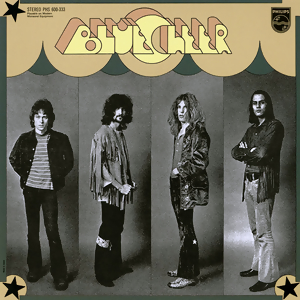
Blue Cheer is the fourth album by American rock band Blue Cheer. It was recorded at Wally Heider Studios in San Francisco and released in December 1969 by Philips Records. Gary Lee Yoder contributed songwriting for the opening and closing tracks and would later join the group as guitarist on their next album The Original Human Being.

The Original Human Being is Blue Cheer's fifth album. It was released in 1970 and shows Blue Cheer exploring a more psychedelic and laid‑back rock and roll with horn sections on a few of the songs. This album features a very unusual, and different, song for Blue Cheer: "Babaji ", which features extensive use of sitar and synthesizer. These instruments were only used one other time in the song "I'm the Light" on the album Oh! Pleasant Hope.

The Beast Is Back is the seventh album by a newly reformed Blue Cheer, 13 years after their previous album, Oh! Pleasant Hope (1971). It contains re-recorded versions of some of the band's most popular songs from their late-1960s heyday as well as new material. The album features founding members Dickie Peterson and Paul Whaley. Original guitarist Leigh Stephens did not participate in the reunion.
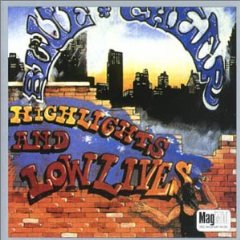
Highlights and Lowlives is the eighth studio album by American rock band Blue Cheer, released in 1990 and produced by Jack Endino. The bonus track Blues Cadillac is on some versions/releases and can be hidden on some of the CDs.
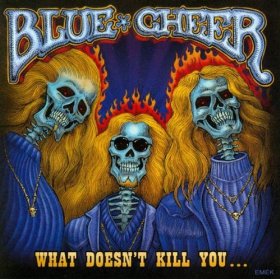
What Doesn't Kill You... is the tenth and final studio album recorded by American rock band Blue Cheer. It includes a remake of their song "Just a Little Bit" originally from their album Outsideinside and a cover of the classic blues song "Born Under a Bad Sign." David Fricke has called the album "a strong studio calling card." The album features Pentagram drummer Joe Hasselvander on half of the album's tracks while the other half features original drummer, Paul Whaley. The title alludes to Nietzsche's aphorism "What does not kill me makes me stronger".
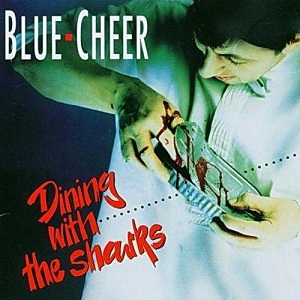
Dining With the Sharks is the ninth studio album by American rock band Blue Cheer. It features a cover of Jimi Hendrix's classic "Foxy Lady".
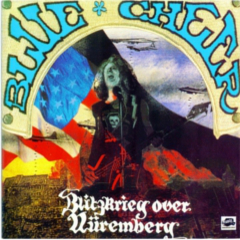
Blitzkrieg Over Nüremberg is the first live album by American blues-rock band Blue Cheer. It features a cover of Jimi Hendrix's classic "Red House".
Kak was an American psychedelic rock band, based in San Francisco between 1967 and 1969.

















